Buyer's Guide to Sports Memorabilia
Written by Alexander Bitar
Are you interested in purchasing Muhammad Ali's fight-won gloves, a Tom Brady rookie card, or why not a signed jersey by Pelé? This buyer's guide to sports memorabilia will help you make a wise decision for your next collectable. If you'd like to get a Sports Memorabilia valuation within 24/48 hours from our online specialist, simply upload a photograph and tell us any other details you know about the item.
Mickey Mantle of the New York Yankees, batting at Yankee Stadium, 1960. (Bettmann/Getty Images)
What Is Sports Memorabilia?
Sports memorabilia can be defined as any object closely related to and gains value from its relationship to the sports industry and its players. This category of collectables includes a wide range of objects, the most popular being sporting equipment used and/or signed by athletes (such as balls, bats, and gloves), trading cards, photos, autographs, and sports clothes. Basically, sports memorabilia is anything that bears the memory of teams or individual athletes, as well as specific events.
To value your sports memorabilia, press here for a valuation.
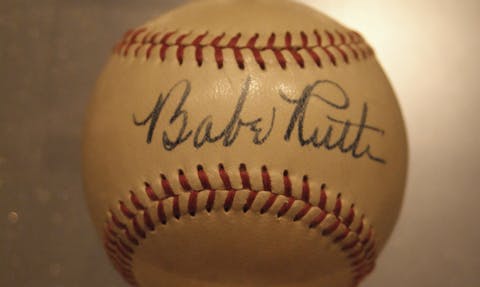
A signed baseball by Babe Ruth, one of the most famous autographs in sports history. (Shamblesuk)
The Market For Sports Memorabilia
Although sporting mementoes, autographs, and trading cards were already popular in the early 1900s, it was only in the late 20th century that the market for sports memorabilia started to develop. Since then, it has grown steadily and was estimated at roughly £30 billion in 2022. Nowadays, sports memorabilia sells worldwide, especially in emerging markets, and are subject to specialised sales, some even breaking new records. From Babe Ruth's 1920 Jersey to Muhammad Ali's boxing gloves, unique and rare pieces are now regularly valued and sold for above £1 million. In August 2022, a mint-condition Mickey Mantle baseball card sold for a record-breaking $12.6 million at auction, holding the title of the most expensive card in the booming sports memorabilia market. Top-earning items tend to represent or are closely tied to success, such as game-worn jerseys, medals, or trophies.
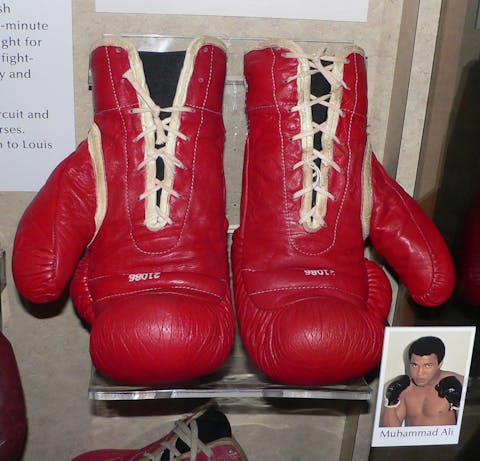
A pair of Muhammad Ali's boxing gloves, on display at the National Museum of American History, Washington, DC. Image: Mark Pellegrini / License: CC BY-SA 2.5
Are Sports Memorabilia a Good Investment?
The short answer is yes. Over the years, it's documented that sports memorabilia increases in value, especially if it's high-quality items. The safest bet for investing in sports memorabilia is to go after the legends of each sport. In terms of baseball, Babe Ruth is a safe card, and the value of his collectables will gradually increase yearly. A modern player who is still active is less reliable due to the reason that anything can happen. The player could, for example, get a long-term injury, he could play badly, and he could also say something controversial in an interview that makes his image look bad. There are many examples where things could go wrong; that's why it's always safest to go with the all-time greats.
What To Know Before Buying Sports Memorabilia
Here are our top tips to help you make an informed decision when buying sports memorabilia.
Like any other memorabilia, sports memorabilia is often purchased for sentimental reasons, but that does not mean it cannot also be seen as an investment. If you are hoping the piece will be a wise investment, it is crucial for you to do your research. The best way to know the item's value is to have the item(s) valued by Value My Stuff.
Follow these easy steps to value your sports memorabilia.
Research other items that have sold that relate to the athlete or team to understand the market demand for the piece. Ask questions, such as whether the team or athlete has a large following or contributed something to their field that will make sure they are remembered. This would help assess, to a certain extent, whether your investment could be profitable in the future or not.
Be smart when buying sports memorabilia: a large market often means the counterfeit market is of considerable size, too. To avoid fraud, go to reputable places to acquire your sports memorabilia. These include well-renowned shows, sports commissions, dealers, and auction houses. You should also buy only authenticated memorabilia to prevent being the victim of scams. However, remember that a certificate only sometimes guarantees that a sports memorabilia will be of good quality or legitimate. Certificates can also be faked. Consequently, we recommend you assess the legitimacy of the company that provided it.
It's common for legitimate institutions selling sports memorabilia to take pictures of the athlete signing the item as proof. Always ask to see the images.
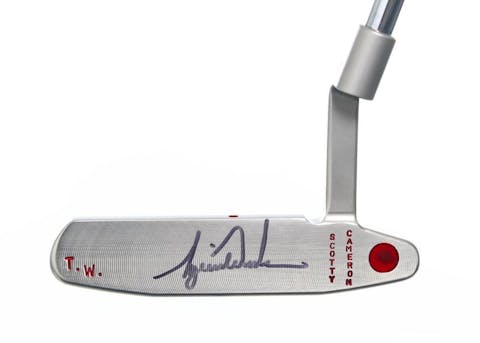
A golf club, used and signed by Tiger Woods (Golden Age Auctions)
How To Value Sports Memorabilia
Only a professional can provide you with a sure and particular range of value and an up-to-date price for your sports memorabilia by using their experience and expertise to eliminate as much chance for misstep and error as possible.
There are several aspects experts must take into account in order to value sports memorabilia. These include the subject matter, athlete or team tied to the piece, the edition number, and most importantly, the significance of the memorabilia in the history of the game or sport. In addition, the type of object also influences the value, as a trading card will not be worth the same amount as a helmet, and a game helmet will be worth even more than one never worn on the field.
Luckily, here at Value My Stuff, experts in the field can provide professional valuation services so that you can take the necessary steps to discover how much your sports memorabilia furniture is worth today! Start Your Sports Memorabilia Valuation Here!
Rookie Cards and Rookie-Season Memorabilia
The term "rookie" is often used when discussing sports cards. The best type of sports card is often the player's rookie card (RC), meaning the card that was produced during his first year as a professional player.
Rookie-season memorabilia are items from that first season, which also is of high interest to collectors. However, memorabilia from specific historical games or seasons where the players win a major trophy could trump rookie-season memorabilia. In the end, it's all about story-telling. The same situation is with signed baseballs, footballs, or other equipment that was a part of the major sports event.
During the right auction, there is no limit to the final price of a famous item like that. Still, based on several sports memorabilia analysts, the value of an item only goes higher when the players have retired and established themselves as pillars of the game.
How To Authenticate Sports Memorabilia?
Commonly, sports memorabilia is accompanied by a Certification or Letter of Authenticity (COA or LOA). These certifications are preceded by third-party companies that have experts that authenticate items. The most popular examples are PSA/DNA, JSA, and Beckett. When an item is sold with a certification from a known and reliable source, then the value of the item is higher than it otherwise would be. That's why the third-party authenticators charge a fee for their service, and that's why collectors are willing to pay the price. The cost can be a few thousand pounds for high-end items, like a precious sports card. But typically, it's a £80-£150 fee.
The authentication process often contains research of other signed items and autographs of famous players when it comes to authenticating sports equipment like signed jerseys, tennis balls, footballs, hockey pucks, bats, baseballs, or shoes. It helps if the owner provides a photo documenting when a player signed the item.
When it comes to other memorabilia, such as collectable sports cards, it is usually the research of paper, the serial numbers, the pigments used, and the overall historical knowledge about the sports cards and sports history that helps to certify and grade them. The higher the grade, the more precious, rare, and valuable a sports card is.
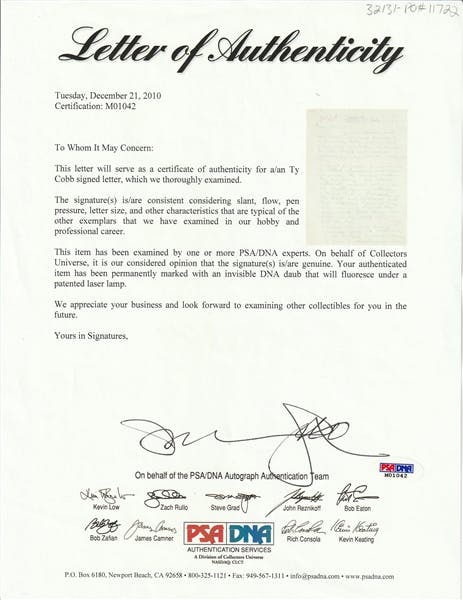
A Letter of Authenticity (LOA) from PSA/DNA for a handwritten letter by Ty Cobb. (Goldin)
Photo-Matched Memorabilia
Another way to authenticate sports memorabilia is to photo-match them. That is if the memorabilia is used by a particular player, for example, game-used or game-worn during one or multiple games. It's not easy to photo-match, mainly if it was used 50+ years ago, since it's essential to have high-resolution images or video footage. The quality of the photo has to be so good that you can match it with the item.
Having items photo-matched by third-party authenticators is more complicated than just having a signed photo authenticated. The fee for this service is much higher than to authenticate an autograph, as it usually starts at £1,000 and goes up.
How Much Is My Sports Memorabilia Worth?
The best way to find out how much your sports memorabilia is worth is to get them valued by an expert. You can get some idea of what the specific item is worth, be it a signed Micheal Jordan basketball, Mickey Mantle autographed baseball, or Tiger Woods rookie sports card, by checking the prices those items got on previous auctions and knowing what condition and grade your sports memorabilia are. You can also check out the multiple sports memorabilia guides online.
If you are unsure of the value of Sports Memorabilia you are interested in purchasing or want to make sure it looks legitimate, our experts are here to help. Press here for more information.
The Most Expensive Basketball Jersey Ever Sold
Earlier this year, Sotheby's sold Wilt Chamberlain's 1972 NBA Finals jersey for sale £4 million ($4.9 million) , making it the world's third most expensive basketball jersey ever to be sold. At the number one spot is Michael Jordan's 1998 NBA Finals "Last Dance" jersey, which sold for $10 million, and at the second place is Kobe Bryant's 2007-2008 jersey worn 25 times during his MVP season, which sold for $5.8 million.
Read More: Wilt Chamberlain’s 1972 NBA Finals Jersey Sells For £4 Million
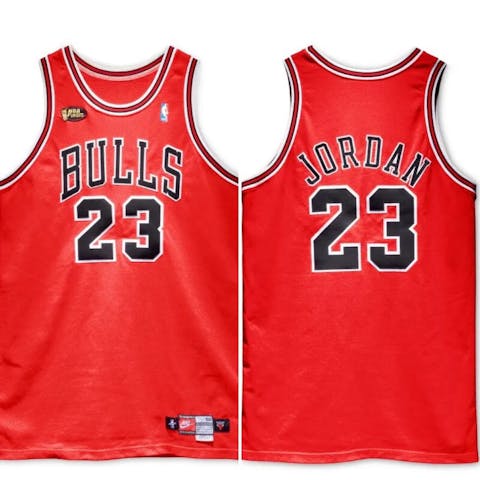
Michael Jordan’s 1998 NBA Finals “Last Dance” jersey. (Sotheby's)
Sports Cards
The first examples of sports cards can be traced back to the period just after the Civil War, when baseball saw a significant increase in popularity amongst Americans, and photographs of baseball players would be printed on either cabinet cards or the smaller "carte de visite", and kept as souvenirs. Later, sports-related images would be printed on cards with advertisements on the back and passed out on the streets as "trade cards". Tobacco companies in the late 19th century would include small sports cards in a pack of tobacco to boost sales. However, the sports cards as we recognise them today until the middle of the 20th century, with brands like Bowmans and Topps producing large numbers of products to be collected by young sports enthusiasts.
When buying sports cards, there are two fundamental factors to look for: rarity and condition. In short, that's what sets the value. Do you perhaps own a rare Honus Wagner or another card you don't know the value of? Begin your valuation here!
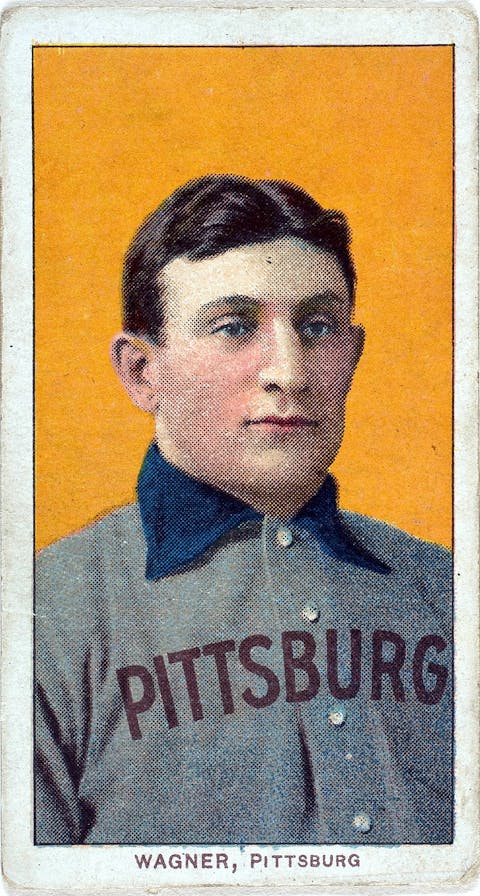
The iconic Honus Wagner T206 Honus Wagner. (Public Domain)
The Most Expensive Sports Cards Ever Sold
1. Mickey Mantle 1952, Topps #311, SGC 9.5. Sold for $12,600,000 by Heritage Auction in 2022.
2. Honus Wagner 1909-1911, T206, SGC 3. Sold for $6,900,000 by Robert Edwards Auctions in 2021.
3. Lebron James 2003, Upper Deck #78, BGS 9. Sold for $5,400,000 by PWCC Marketplace in 2021.
Read More: How to Value Sports Cards
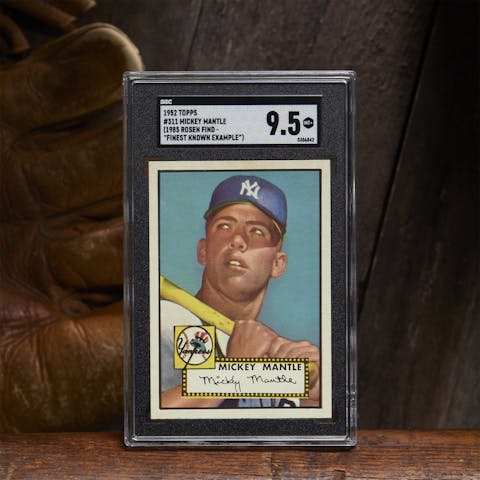
The record-breaking Mickey Mantle card that sold for $12.6 million. (Heritage Auctions)
Our Sports Memorabilia Experts
Value My Stuff's sports memorabilia specialist has worked in the industry for over 40 years, including for Christie's in their sporting department and as a tennis specialist for 13 years. He also holds Thea racket and equipment specialist position at the Wimbledon Lawn Tennis Museum. He runs his own company, which was formed in 1928 and has been involved in all racket sports, golf equipment, and football memorabilia.
Our Sports Memorabilia expert for the UK market grew up with close family connections in football, cricket, and steeplechasing, and it was from this that he developed an interest in the category. In the past, he created this expertise by working as a consultant for Sotheby's in the Collector's department, specialising in Football Memorabilia.

